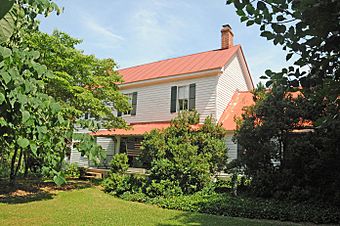Piney Grove at Southall's Plantation facts for kids
|
Piney Grove
|
|
 |
|
| Location | VA 615, Holdcroft, Virginia |
|---|---|
| Area | 5.2 acres (2.1 ha) |
| Built | c. 1800, c. 1820, 1853, c. 1905 |
| Architectural style | Log building |
| NRHP reference No. | 85003052 |
Quick facts for kids Significant dates |
|
| Added to NRHP | November 26, 1985 |
Piney Grove at Southall's Plantation is a special place in Holdcroft, Virginia, in Charles City County, Virginia. It is listed on the National Register of Historic Places, which means it's an important historical site. This property shows how homes were built in the 1700s, 1800s, and 1900s near the James River.
Most of these buildings are north of today's Virginia State Route 5. They are simple wooden homes, different from the big brick houses of very rich families. Those grand homes were usually built right along the James River. Piney Grove is on a higher ridge, in an area where plantations were smaller and homes were more modest.
The oldest part of the house was built around 1800. It started as a small log building, about 20 by 22 feet, used to store corn. Around 1820, it was made bigger and became a log store. In 1853, two more parts were added. Then, in the early 1900s, a two-story section was built, which included the 1853 additions.
This house is a rare example of log buildings in Tidewater Virginia. It's also unique because an old farm building was made into a much larger home twice. Piney Grove was added to the Virginia Landmarks Register and the National Register of Historic Places in 1985.
Contents
History of Piney Grove
Before English settlers arrived in the 1600s, the land where Piney Grove stands was home to the Chickahominy (tribe) people. The plantation site is close to the Mattahunk village and a path called Necotowance's Path.
The Southall Family and Early Days
In the late 1700s, this 300-acre plantation was one of many owned by the Southall family. They had other properties in Charles City County, like Mt. Airy and Milton. They also owned homes in Henrico County and Warwick County.
The first part of the Piney Grove house was built before 1790. It was a log corn crib on the Southall plantation. It is a well-preserved example of early log architecture in Tidewater Virginia. In the early 1700s, Furneau Southall was a deputy-sheriff in Charles City County. During the American Revolution, Southall was part of the Charles City County Committee of Safety. He also led one of the Charles City County companies.
In 1790, Furneau Southall helped with the first U.S. Census in the area. At that time, Furneau Southall, his wife, and their seven children lived on the plantation. Sixteen enslaved people also lived there. Their names included Amy, Bess, Bristol, and Rose. Records also show what furniture, books, and animals were on the plantation.
The Southall family owned the plantation until 1857. Then, Furneau's grandson, John Seth Stubblefield, sold part of it to Edmund Archer Saunders. This part included the log corn crib, which by then was a store. The additions made in 1851 might have used wood from the original plantation house. Under Saunders's ownership, the store became known as Piney Grove Store.
After the Civil War
After the American Civil War, Saunders moved to Richmond. He became a successful wholesale grocer. He bought many properties in Charles City County, like Indian Fields and Weyanoke. He also gave a beautiful stone baptismal font to Westover Episcopal Church, which is still used today.
Thomas Fletcher Harwood ran Piney Grove Store from 1874 to 1915. In 1905, he made the store building bigger and turned it into a five-bedroom home. During Harwood's time, his son, Dr. Ashton Harwood, had his doctor's office on the property. The Harwood family children's cemetery is also on the grounds. It has fancy cast-iron fences made by the Cincinnati Ironworks. From 1916 until 1984, the Hughes family owned Piney Grove.
Piney Grove Today
In 1984, the Gordineer family bought Piney Grove and spent five years restoring the house. Some original buildings on the property are still there, like a smokehouse, a chicken house, and sheds for farm equipment. Old photos show there used to be barns and a dairy that are no longer standing. You can still find the remains of Dr. Harwood's office.
Piney Grove is now filled with old furniture and items that tell the story of the property. These include family antiques from the Gordineer family, who are related to Judge Edward Bowen of Quebec, Canada.
The property also has other old buildings that were moved there to save them from being torn down. These include Ashland (built 1835), Dower Quarter (built 1835), Ladysmith (built 1857), Duck Church (built 1917), Pocahontas Tea House Outhouse (built around 1930), and Peace Hill Smokehouse (built around 1920). There's also a copy of the Lanexa Farmstand (built around 1940).
Piney Grove is listed on the National Register of Historic Places. The grounds are open every day from 9:00 a.m. to 5:00 p.m. You can also book guided tours of the house. If you want to stay overnight, bed and breakfast rooms are available in the historic Ladysmith house on the property. Piney Grove is part of several special trails and programs, like the Virginia Civil War Trails and the Jamestown Discovery Trail.
See also
 | Georgia Louise Harris Brown |
 | Julian Abele |
 | Norma Merrick Sklarek |
 | William Sidney Pittman |



